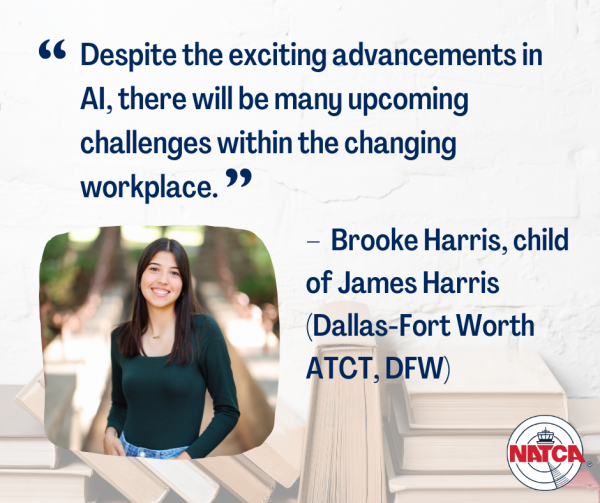
Read 2024 Scholarship Winner Brooke Harris’s Essay
Every year, NATCA offers a scholarship program for spouses, children, stepchildren, and legally adopted children of active, retired, and deceased members in good standing for at least two consecutive years. This scholarship is for full-time attendance at accredited colleges and universities within the United States and its territories for an undergraduate degree program.
This year’s prompt asked candidates to examine the effect of artificial intelligence on workers and labor unions.
Brooke Harris, child of James Harris (Dallas-Fort Worth ATCT, DFW) is among this year’s 20 scholarship winners. Below is the essay that Brooke submitted.
Despite the exciting advancements in AI, there will be many upcoming challenges within the changing workplace. I have had an interest in becoming an early education teacher for as long as I can remember and will be pursuing it in my college career. Advancements in AI mean changes not only for teachers themselves but also within the profession as a whole. This is due in large part to the rapid development and implementation of AI in the education workspace. One of the many challenges teachers will face is increased reliance on AI instead of teachers, but conversely, a positive change will be the implantation of new resources for teachers to use in the classroom.
As people become reliant on AI tools, the greater the danger of computer-based solutions consuming the jobs of many, including the teaching profession. As computers and AI are incorporated into the classroom, there will be an increase in online-based work and a perceived decrease in the need for teachers inside the classroom despite the value of face-to-face instruction. The curriculum will lean more heavily on structured online courses, robbing students of creative opportunities needed in the classroom. We can already see a shift towards using school-issued computers and software for early childhood education, both inside and outside the classroom, with less teacher assistance. This will make students more reliant on self-instruction, leaving the potential for a degraded teacher-student relationship, one of the most crucial aspects of learning.
One encouraging aspect of AI incorporation into teaching includes new tools unlocked with the use of AI. Instead of spending hours to create lesson plans and daily activities teachers can use AI to help reduce the amount of prep time and other menial tasks required to have a productive lesson plan for students. Utilizing AI to overcome creative blocks in planning, grading, and creating lesson plans will allow more time to focus on helping students and engaging and interacting with students on a one-on-one basis.
With strong labor unions within education, teachers could be protected against-cutting measures attempting to reduce the overall number of teachers. This is important because teaching is an innately human experience. Just as online learning is ineffective in K-12 education when compared to in-person, so too an overreliance on AI could be detrimental to learning. Even though AI will be a helpful resource in the classroom, unions should protect against attempts to overburden teachers by increasing student to teacher ratio. Some policymakers and administrators look at nothing more than the bottom line on an accounting sheet and may think the solution to their budgeting woes would be to reduce labor costs through a reduction in the overall number of teachers. Strong union protections are necessary for teachers to resist cost-cutting measures, benefiting both themselves and future students.

